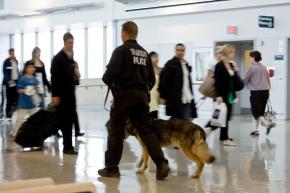Racial profiling in the skies
reports on recent reports of racial profiling that's rife at the Logan Airport.
THE TRANSPORTATION Security Administration (TSA) at Logan Airport believes it's found the best way to root out "terrorists." It's called racial profiling.
More than 30 TSA officers at the Boston airport have filed internal complaints about the "behavior detection" program that is supposed to detect potential terrorists. The only thing that the program is detecting is non-white travelers trying to use the airport.
In addition, more than a half-dozen white and minority TSA officers have taken their concerns to the American Civil Liberties Union (ACLU).
"They just pull aside anyone who they don't like the way they look--if they are Black and have expensive clothes or jewelry, or if they are Hispanic," said one white officer, who along with four others spoke with the New York Times on the condition of anonymity.
Logan was the first airport to implement "behavior detection" in 2003, modeled on Israeli security techniques, which identify passengers as suspicious based on appearance, body language and responses to questions
The result, as reported by the New York Times, has been that passengers who "fit certain profiles--Hispanics traveling to Miami, for instance, or Blacks wearing baseball caps backward--are much more likely to be stopped, searched and questioned for 'suspicious' behavior."
It is, of course, a humiliating experience, Kenneth Boatner, a 68-year-old African American psychologist, explained to the Times. Boatner said he was pulled out of line and detained for about half an hour as TSA agents went through his checkbook, clinical notes about his clients, and his cell phone.
"I had never been subjected to anything like that," he said.
Boston officers said that they believed that minorities made up to some 80 percent of the people stopped and searched during certain shifts.
They also said that managers demanding high numbers of stop and searches led some workers to target minorities because they believed that they would result in more arrests for drugs, outstanding arrest warrants or immigration problems.
"THE BEHAVIOR detection program is no longer a behavior-based program, but it is a racial profiling program," one TSA officer wrote in an anonymous complaint obtained by the Times.
In other words, the official rules combined with the demand for results gave the official stamp for racist targeting of passengers at the airport. But the program itself is based on a racist profile of what a "terrorist" supposedly looks like.
According to the profile used in Boston, they are never white (and you can assume they're not in the first-class seats). They don't usually looks like Timothy McVeigh, the white supremacist responsible for the 1995 Oklahoma City bombing of a federal office building.
And they probably don't look like Wade Michael Page, the neo-Nazi who shot Sikh worshippers inside their temple in Wisconsin two weeks ago, either. In fact, Wade was able to enter the Sikh temple freely, without even a question. It's questionable whether TSA officials at the Logan airport have shown the Sikhs the same courtesy.
The program isn't just limited to Logan. There are 161 airports that now use the "behavior detection" technique, and the TSA plans to expand it to more airports--using Boston as a model.
Carol Rose of the Massachusetts ACLU points out that when abuses were reported earlier in New Jersey and Hawaii, "Ironically, the TSA responded by sending in Logan TSA screeners to 'train' TSA screeners in those states. If Logan airport is the model for the rest of the nation, we're in trouble."
The General Accounting Office has investigated the program and, as a result, urged Congress to free freeze the budget for behavioral detection programs until and unless there is actual scientific evidence that it works.
Despite this and the fact that TSA officers are stepping forward--which, in and of itself, is an unusual move--with complaints, the TSA is defending the program.
"[T]he deterrent value of the program can't be overstated," the agency said in its statement. Monitoring passengers' behavior "adds another layer of security to the airport environment and presents the terrorists with yet one more challenge they need to overcome," the TSA said.
The program was initiated in 2003 in the wake of September 11, and is based on the frenzy of fear whipped up by U.S. government officials after the attack. This climate of fear as a result of the "war on terrorism" gave government officials carte blanche to push through any number of civil liberties-shredding measures--including the targeting of Arabs and Muslims.
It was in the context of xenophobia and hysteria over so-called "Muslim terrorists" in every corner, that airports initiated this program. It wasn't based on actually providing any actual safety or security.
It only makes sense that policies based on these racist assumptions will lead to rampant racial profiling in airports. The TSA should hardly be surprised.
When the rights of one group are taken away in the name of "security," everyone's rights are in line for the chopping block. We have to fight together against the racism that is official policy in airports and neighborhoods across the country.



